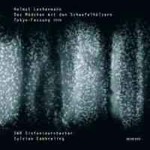
Das Madchen mit dem Schwefelholzern (The Little Match-Girl)
 $64.00
Out of Stock
$64.00
Out of Stock6+ weeks add to cart
LACHENMANN
Das Madchen mit dem Schwefelholzern (The Little Match-Girl)
SWR Symphony Orchestra / SWR Vocal Ensemble / Sylvain Cambreling
[ ECM Records / 2 CD ]
Release Date: Sunday 1 December 2002
This item is currently out of stock. It may take 6 or more weeks to obtain from when you place your order as this is a specialist product.
"Das Mädchen mit den Schwefelhölzern", the composer's first piece of music theatre, is based on Hans Christian Andersen's The Little MatchGirl, which he interprets as an attack on a cold and indifferent society. The piece has appeared previously on the Kairos label. There isn't much to choose between the two recordings in terms of performance, but the new ECM version has a pleasing precision that suits Lachenmann's vision well.
"Das Mädchen mit den Schwefelhölzern, the composer's first piece of music theatre, is based on Hans Christian Andersen's The Little MatchGirl, which he interprets as an attack on a cold and indifferent society. The piece has appeared previously on the Kairos label. There isn't much to choose between the two recordings in terms of performance, but the new ECM version has a pleasing precision that suits Lachenmann's vision well. The chief difference between the two versions lies in a substantial revision under- taken by the composer. The oft-recorded '...
zwei Gefühle...' scene is here abridged, subtly altering the work's balance while not quite diminishing the sequence's importance to the whole. Though the work has been shortened only barely, it's possible that a greater concision results, aided perhaps by the slightly tauter sound. Lachenmann's music demands the listener's active engagement, a determined effort at understanding, but here are rewards to be reaped from perseverance." Gramophone Classical Music Guide, 2010
"Retelling Hans Christian Andersen's tale of the little match girl who freezes to death on Christmas Eve as a parable of modern society's inhumanity, while drawing parallels with the fate of the Baader-Meinhof terrorist Gudrun Ensslin, Das Mädchen mit den Schwefelhölzern immediately established itself as one of the major pieces of European music theatre in the late 20th century... the power and originality of Lachenmann's score - the use of alienated orchestral sounds and vocalisations, all scrupulously organised, to create a compellingly dramatic soundscape around and about this universal tragedy - remain intact." BBC Music Magazine, September 2004 ****